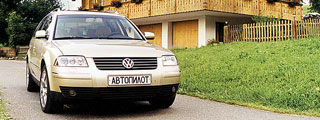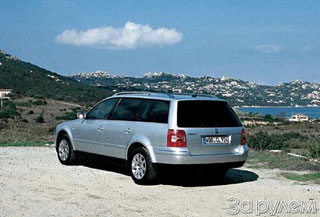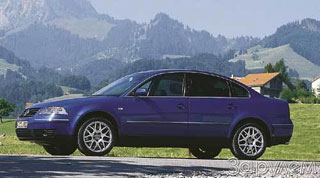Test drive Volkswagen Passat B5 2000 - 2005 sedan
The harbinger of the era
I called this article a harbinger of the era because, it seems to me, in a couple of decades a car with a gasoline engine will become the same anachronism as steam locomotives now. After all, if gasoline engines have already exhausted the resource of improvement, then with diesel engines still work and work. And even if some, out of habit, associate passenger diesel engines with tractor, there are already serial models that are able to furnish almost any gasoline version. It is no secret that in prosperous Europe, especially in Germany, in recent years, diesel versions are in greatest demand among new cars. Moreover, if earlier a diesel car was considered only as more economical and cheap in the content of an alternative, then in recent years diesel engines began to compete with almost all gasoline versions. It even comes to the point that some automakers have individual models in the most luxurious configuration and with a diesel power unit are much more expensive than the same, but gasoline.This Volkswagen Passat B5 came to our test thanks to its new diesel motor. In addition to the existing 1.9- and 2.5-liter turbodiesels with a capacity of 90 to 150 hp, a new version of the 1.9-liter engine has appeared, developing a capacity of 130 hp. A lot has already been written about the driving and caring qualities of the B-fifth, so today we will only talk about what is connected with the new turbodiesel. Although it is also impossible to call it fundamentally new-the same 1.9-liter turbodiesels are based on this 130-horsepower engine, which was installed on B3 in the early nineties. True, since then, the engine has been improved and modernized many times, so its characteristics are an order of magnitude higher than that of predecessors. Firstly, it works much quieter, and vibrations have become smaller, although it is impossible to call it exemplary: now less vibration-loaded diesel engines are also produced. But this is what this Passat TDI cannot be blamed with a new engine is in the absence of torque. If you hold the tachometer arrow in the right speed range, then in dynamics this car will be not much different from the gasoline counterpart of about the same power.
Like almost all diesel engines, this power unit also has a not very wide range of revolutions. Despite the fact that the tachometer is marked up to 4000 rpm, in fact, you no longer want to twist the engine above 3000 rpm. However, there is enough traction without this: literally with idle revolutions, this Passat can go in almost any gear. It is quite seriously - 40 km/h in the fifth gear with such an engine no longer seemed to be out of the ordinary, rather, on the contrary, because you immediately begin to think about how it still traveled on a high -speed gasoline version. Another thing is that after the pleasant acceleration that Passat develops in the 2000-3000 rpm in the range, I don’t want to go in the same way-every time the revolutions fell below the indicated range, I somehow involuntarily switched to a reduced gear. Yes, if there is a desire to go very dynamically, then you will have to switch very often, probably even very often, since this version is equipped with a six -speed gearbox. However, for a driver, accustomed to a car with mechanics, this will not become an obstacle, moreover, it has a chance to turn into pleasure. The lever is made of very pleasant to the touch and beautiful material, and thanks to its minimum strokes, switching transmission simply, as they say, in high. And the most optimal option for the city is such a turbodiesel, but only in combination with a machine gun. A little thoughtful in combination with a gasoline power unit, especially with a turbocharged, here he can fully show all his virtues, such as smooth switching and quick adaptation to any driving style.
But the most pleasant thing for the owner of a turbodiesel car is fuel consumption. And here Passat TDI was just at a height: even with a very argessive driving style, the average fuel consumption, the testimony of which were constantly displayed on the on -board computer, was no more than 8 l/100 km. But it was worth leaving for a more or less straight section of the road, turning on the highest, sixth gear, as these chicks were replaced by others, simply shocking. You can imagine that the station wagon, in size slightly lagging behind the business class, consumes on the track about 5 l/100 km! After that, you willingly believe the representative of the company, who drove to Kyiv in such a car, spending only ... $ 10 on refueling. I wonder how much such a trip to a gasoline car will cost, even with a smaller engine volume?
Pavel Kozlovsky
Video Test Drive Volkswagen Passat B5 2000 - 2005
VOLKSWAGEN Passat B5 2000 - 2005 - 2005
Volkswagen Passat B5 2000 test drives - 2005
Krash Test Volkswagen Passat B5 2000 - 2005
Krassh Test: Detailed Information28%
Driver and passengers
13%
Pedestrians
Malfunctions Volkswagen Passat B5 2000 - 2005
Volkswagen Passat malfunctions: Detailed information| Passat B5 2000 - 2005 | |
|---|---|
| Engine |  |
| Transmission |  |
| Control system and suspension |  |
| Brake system |  |
| Air heating and air conditioning |  |
| Launch and charging system |  |
| Electric components and so on |  |
| Corrosion body stability |  |












